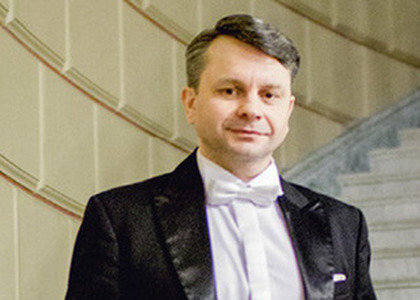> [Archived] Interviews

Interview with conductor Mihail Agafița
The event's program consists of Post Symphony No.2 by Octavian Nemescu and Act I from Luceafărul oratorio by Andrei Tănăsescu, both works being interpreted in an absolute first audition. Details about the concert and the importance of new music will be offered by conductor Mihail Agafita in an interview by Petre Fugaciu:
First, I would like to talk about the two works. What should the public know about them before these absolute first auditions?
Both are contemporary works. They are very different and interesting, each in its own way. A very large orchestra is used, with many percussions, with many interesting inserts in the work of master Nemescu and, respectively, another vocal-symphonic work of master Tănăsescu, which is in contrast to the first. It's a novelty, because both are at their first audition. I hope you will like it.
How do you regard this relationship between contemporary composers, interpreters and public? Do you think it has changed throughout the years?
I believe that something has significantly changed because contemporary music has always had our attention, performers' attention, and that's how it should be; it was enjoyed as well by the public, the experimented public, of course, because any type of music - I have always said that - any type of music was new contemporary music, even Mozart's, Beethoven's or Ceaikovski's, all were considered new music at their time. And some works, as we already know from history, happened not to be pleasantly welcomed by the public at their first audition, as it happened with Stravinski, Rahmaniov and others. Finally they were appreciated by everyone. This is the faith of contemporary music, to be released for the first time and come as a delight or as a shock, and after all, as a delight. It is an absolutely normal process, which has happened through centuries.
International Week of New Music is a festival which already has tradition. What significance does it have for performers and how do you think, for instance, young conductors can be won over from contact with new music?
If we were to talk about conducting it is something completely different to conduct new music, not all music, of course. So it is necessary that a conductor has aptitudes or other technical qualities. Of course, this festival is an extremely important one. I want to admit that it is for the first time when I conduct this festival and I am very honoured to be invited, despite the fact that I usually conduct much new music. Even when I return to Chișinău, the next concert I am going to have in Chișinău in June is as well a part of New Music Festival, which takes place every year there. Both festivals and all similar festivals have very beautiful traditions which support contemporary music.
Translated by Mara-Sabina Rolea,
University of Bucharest, Faculty of Foreign Languages and Literatures, MTTLC, year I
Corrected by Silvia Petrescu














